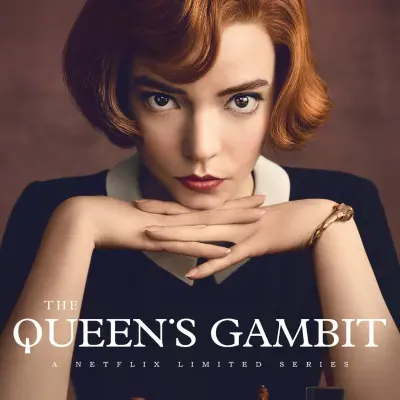As The Queen's Gambit's sole Black character, Jolene feels like "blatant tokenization"
-

While charming thanks to Moses Ingram's performance, "it is just unpleasant to watch Jolene talk like a weird Blaxploitation character in a show that doesn’t touch on race at all outside of her," says Princess Weekes. "The world we see of chess is overwhelmingly white, which—as someone who grew up watching old Black men, and old men of all races, in the parks play chess—doesn’t ring true to me, but even putting that aside for a number of reasons, it makes Jolene’s Magical Negro reappearance cringe. Jolene gives Beth, a character who has not reached out to her in years, thousands of dollars as a “loan” to go to Russia. It is a kind gesture, but it feels so hollow. I wondered why, in the final episode, the reappearance of all of the other supporting dudes in Beth’s life (Harmon’s Boys, as I call them) felt touching in comparison to Jolene. It’s because while all those characters served a place in Beth’s life, they also felt like bigger parts of her life, who made multiple appearances throughout her chess career. Jolene just felt like a nod to a character who had been there with Beth in the beginning. I think the story wanted to show with her return that Jolene, another underdog, made it after Beth left and had her own story to tell. But it rings false when, onscreen, she feels like a token."
ALSO:
- The Queen's Gambit checkmates the concept of "The Magical Negro": "Jolene represents the death of the Magical Negro as a lazy trope," says Zaron Burnett III. "If you’re unfamiliar, the Magical Negro is the cinematic equivalent of 'I have a Black friend' and tied up in America’s racial caste history. It’s based on the appeal of characters like Uncle Remus, and the fantasy of the Happy Slave who just really wants to see their 'massa' prosper, which gave life to the stereotype of simple-minded, closer-to-earth Black people, the sort of naturally wise folk who aren’t bothered by all the complexities and formalities of the white world. They’re humble, noble savages who can impart great, soulful lessons to a white person who has lost their way." Burnett adds: "None of this, however, applies to Jolene and The Queen’s Gambit. For starters, if the Beth Harmon character had a best friend who was a white girl — a friend who was also an orphan and acted in all the same ways as Jolene — she’d be seen as a secondary character, too. That’s just the rudimentary nature of American storytelling, and how all non-main characters operate in service of the main character, whose story and emotional tale it is. The only way a character isn’t working in service of the main character is if they’re the chief antagonist. Moreover, Jolene may offer money to help out her orphan-sister, but she doesn’t do it because Beth’s white, and thus, more important than Jolene. She offers her money because she cares. If anything, Jolene has complete agency — she’s in the process of becoming a lawyer — and it’s her sense of agency that puts her in the position to help Beth. Jolene has her own fully-formed, nuanced inner world as well."
- The Queen's Gambit is a hit for all the wrong reasons: "The Queen’s Gambit is about seven things at once," says Emily Vanderwerff. "It’s an inspirational underdog story like Rocky. It’s a lovely bildungsroman about a woman learning her own power. It’s a somewhat spotty depiction of addiction. It’s an intellectual game of cat-and-mouse predicated on watching Anya Taylor-Joy just absolutely destroy everyone. (Destroy me, Beth Harmon! Destroy me!) It’s a tremendous acting showcase, not just for (Anya) Taylor-Joy but for a huge collection of character actors. It’s a story where absolutely every supporting character exists to serve the story of one woman, in a manner usually reserved for men, which both leads to some thrilling moments (all those boys selflessly helping Beth when she needs it most!) and some really terrible racial representation (the series’ one Black character is a thankless afterthought). It’s a sports anime. When I watched advance screeners of The Queen’s Gambit—one after the other, having a great time all the while—I had the thought, 'This will never be a hit, but I’m having a good time watching it.' How wrong I was. The show seemed like it took over the world for much of November, and yet despite all of the qualities I described above, it’s pretty much entered mainstream culture as 'that show about chess.' That has me wondering if the qualities that I saw in the show were just ones I projected onto it because I really loved watching it. Was it as good as it seemed to me in the moment? Or was it just something that seemed like good TV, so I accepted it as good TV, because I needed something to watch? Is there a difference? Does it matter?"
- The Queen's Gambit is inspiring women, including actress Beth Behrs, to become chess-obsessed: “They yelled at me at work yesterday because I was hiding my phone under my script,” says The Neighborhood star. “I should have been acting and I was playing on Chess.com.”
TOPICS: The Queen's Gambit, Netflix, Beth Behrs, African Americans and TV
More The Queen's Gambit on Primetimer:
